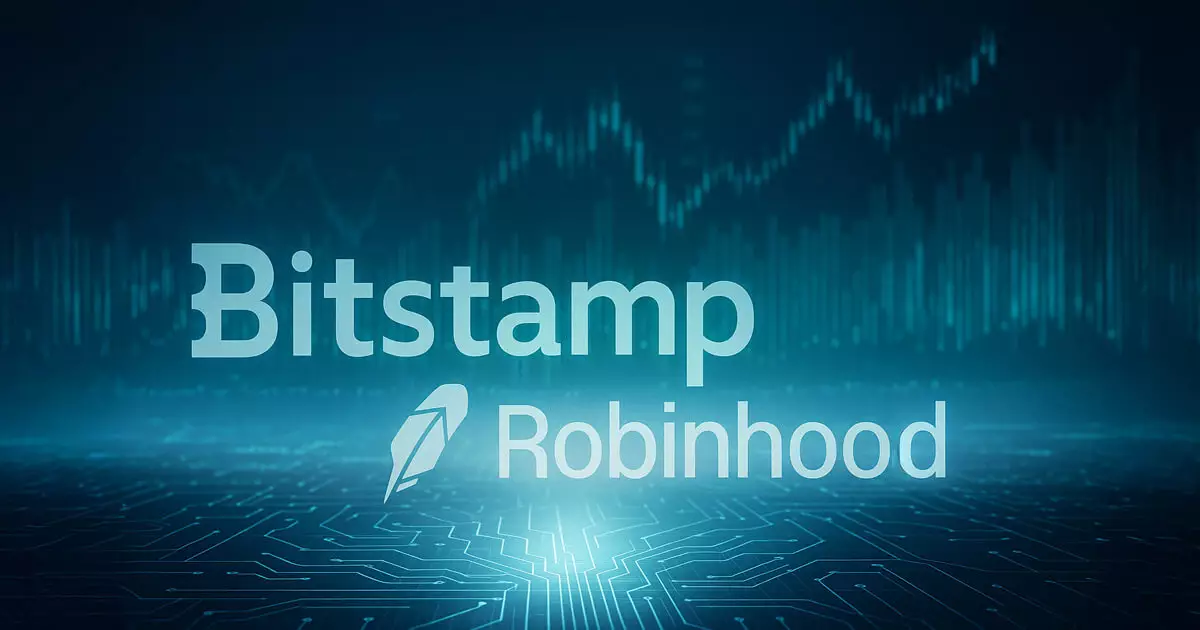The financial landscape has begun shifting dramatically this year, particularly in the realm of cryptocurrency. Robinhood’s recent acquisition of Bitstamp, a respected player with over a decade in the industry, marks a pivotal moment that transcends mere numbers. As Robinhood steps into the global arena, it not only adds 50-plus licenses and four million customers but also a significant institutional revenue line that changes the game for the platform. Here are five reasons why this acquisition should cause both excitement and caution among investors and users alike.
The Institutional Dawn
Robinhood has cultivated a reputation primarily among retail investors; by acquiring Bitstamp, it thrusts itself into the institutional arena, boasting its first-ever institutional crypto business. This pivot is significant because institutional investors often bring a level of stability and trust that retail enthusiasts might not. Bitstamp’s established relationships with high-frequency market-makers and family offices offer Robinhood a multifaceted revenue model that heavily contrasts with its existing reliance on retail order-flow payments. It’s as if Robinhood, once a casual surfer on the crypto wave, has decided to dive deep into the ocean of opportunity.
But the question remains: can Robinhood maintain the necessary credibility to attract these high-profile clients? The transition from being a retail-centric platform to a serious contender for institutional business will require not only new operational frameworks but also an overhaul of its existing image.
Regulatory Gains That Cannot Be Overlooked
Acquiring more than 50 active licenses across Europe, Asia, and the U.S. is a complicated yet impressive feat. Regulatory approvals can be a significant bottleneck in the cryptocurrency market. By bringing Bitstamp under its umbrella, Robinhood can skip years of red tape, which is particularly crucial given the recent scrutiny and regulatory challenges faced by many competitors.
The U.S. Securities and Exchange Commission (SEC) had previously put Robinhood’s crypto operations under investigation, something that loomed like a dark cloud over its business. With the SEC probe finally concluded, Robinhood can chart a clearer course in a territory fraught with regulatory complexities. While other exchanges like Coinbase and Kraken have painstakingly acquired licenses through traditional means, Robinhood’s strategy of acquisition allows it to swiftly navigate these waters—making it a formidable player in global markets.
Expanding the Product Matrix
It’s not just about the established clientele or regulatory advantages; the product offerings also undergo a significant transformation. With the ability to offer over 85 listed coins and features like staking and lending, Robinhood has the chance to become a one-stop shop for crypto investors. This expansion of the product matrix enables the platform to cater to varying customer needs and differentiate itself from other players in the highly competitive market.
While the current U.S. app limitations may still exist, the groundwork has been laid for future enhancements. As Robinhood selectively integrates Bitstamp’s products, it presents a unique opportunity to cultivate a forceful response to the increasing pressure from emerging competitors, aiming for a broader client base that’s not merely confined to retail investors.
The Timing Could Not Be Better
The acquisition, announced amid resurgent enthusiasm in the cryptocurrency sector, signals Robinhood’s optimistic outlook on market trends. After five consecutive profitable quarters, the timing of investing $200 million in Bitstamp reflects a strategic confidence that should resonate with stakeholders. Amidst an environment where many competitors are floundering or facing regulatory hurdles, Robinhood’s timing allows it to capture market share at a crucial juncture.
Many argue that this is an opportune moment for expansion, particularly as investor interest returns, illustrating a potential second wave of crypto enthusiasm that could be more stable than the first. But it also raises essential questions about whether Robinhood can sustain this momentum and avoid the pitfalls that have doomed others in the past.
The Road Ahead: Integration and Reputation Management
As exciting as the acquisition is, the road ahead will demand careful navigation. Integrating Bitstamp’s operations while convincing its loyal user base and existing Robinhood customers of its value proposition is a delicate balancing act. The looming challenge will be forging a transatlantic platform that can deliver a seamless experience to both sets of users. Both the old and the new must feel that their interests are being catered to, and any mismanagement during this transition could risk tarnishing the reputations that both companies have built.
In a rapidly evolving market, the ultimate success of this acquisition will not only rely on numbers and licenses but on how well Robinhood can resonate with its shareholders and customers. It’s a daring move that might just redefine its position in the financial world, assuming the integration is handled with the utmost care and strategy.


Leave a Reply